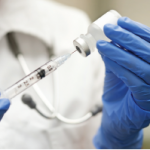 CHICAGO—Rheumatologists often come to Brian Schwartz, MD, associate professor of medicine and vice chief for clinical affairs in the Division of Infectious Diseases, University of California, San Francisco, with a concern: A patient on immunosuppression has a family member who needs a live vaccine, but the patient may be vulnerable to the vaccine’s effects. Should the family member get the vaccine?
CHICAGO—Rheumatologists often come to Brian Schwartz, MD, associate professor of medicine and vice chief for clinical affairs in the Division of Infectious Diseases, University of California, San Francisco, with a concern: A patient on immunosuppression has a family member who needs a live vaccine, but the patient may be vulnerable to the vaccine’s effects. Should the family member get the vaccine?
The answer is yes, but precautions may be needed, Dr. Schwartz said during a session of the 2019 ACR State-of-the-Art Clinical Symposium, held April 5–7. His review of vaccinations in the context of rheumatic disease frequently touched on this theme: Vaccines are often advisable and safe for rheumatology patients—with caveats.
Family & Vaccines
In the case of a close family member getting a live vaccine, Dr. Schwartz said the benefits are worth it, even though “the person you’re most likely to get an infection from is probably the person you’re living with.”
“What I want to highly recommend—and recommend you to tell your patients—is that everybody in their family should get every vaccine that is recommended for them, because I really think a well-immunized family serves as a barrier to protect your patients from getting sick,” Dr. Schwartz said.
However, if a family member is getting a live influenza vaccine, the immunosuppressed person with rheumatic disease should avoid close contact. The patient should also be careful about contact with an infant who has just received a rotavirus vaccination, Dr. Schwartz said.
Effectiveness
When a rheumatologist is about to start a patient on treatment, it’s a good idea for patients and their physicians to consider vaccinations and think ahead, possibly holding off on starting a medication to ensure the vaccine can be effective, Dr. Schwartz noted.
“I want you to think about what you’re doing before you’re starting treatment, because that is the time you can get the most bang for your buck with a vaccine,” he said.
A 2017 study looking at flu vaccinations and methotrexate found patients who had methotrexate held for two weeks before the vaccine and for two weeks after, as well as those who had it held for four weeks after the vaccine, had a more robust response to the vaccine than patients who had methotrexate held for four weeks before or who didn’t have it held at all. However, at the last follow-up visit, patients who had methotrexate held during or after the vaccine experienced about triple the amount of flare—about 20%—compared with 7.5% for those who did not have it held.1



